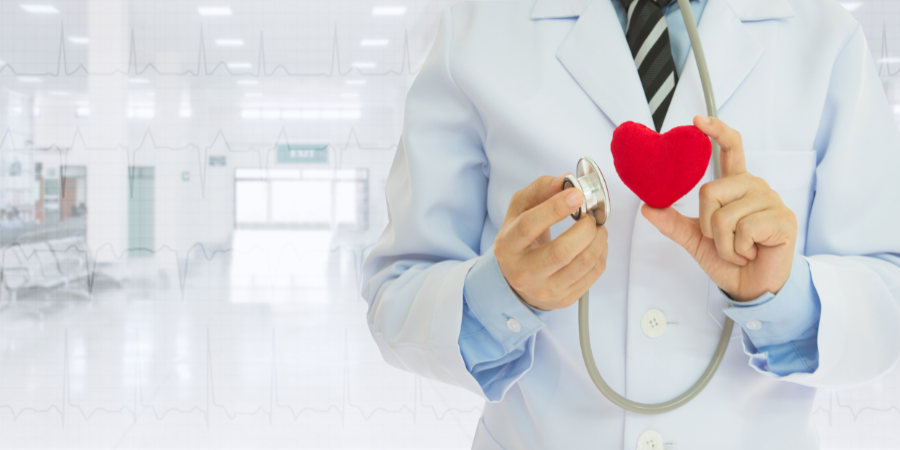



HEART UNDER CONTROL
April 16, 2023
Heart Week will run from April 17th to 24th. It's the perfect time to take care of your health, especially since the statistics are alarming. 35 percent of deaths in Poland are caused by cardiovascular disease. The leading cause of serious illnesses such as heart attacks and strokes is hypertension. A cardiologist offers advice on how to effectively care for your heart to enjoy good health.
Hypertension is an abnormal increase in the pressure of blood flowing through our arteries. It is measured in millimeters of mercury (mmHg) and expressed as two numbers: systolic blood pressure (the higher number is the pressure exerted on the arteries during heart contraction), and diastolic blood pressure (the lower number is the pressure exerted by the blood between contractions when the heart is resting).
What pressure is normal?
According to the European Society of Cardiology and the Polish Society of Hypertension, normal blood pressure in an adult is less than 140 mmHg for systolic blood pressure and less than 90 mmHg when the heart is at rest. Konrad Kaaz With Cardiology Clinic "Your Doctor"” indicates that the correct and most optimal blood pressure is 130/85 mmHg. – Generally below 130. This is the threshold for diagnosing hypertension. Until the age of 65, we should aim for a blood pressure below 130. For older age groups, these values will be higher. the doctor emphasizes.
What causes hypertension?
There are several factors that adversely affect our cardiovascular system and can cause high blood pressure. These include:
- overweight,
- stimulants – cigarettes, excessive alcohol consumption,
- excessive salt consumption,
- sedentary lifestyle,
- stress,
- genetic predisposition
Symptoms of hypertension
High blood pressure often has no symptoms, and when they do occur, they can be associated with other conditions. Certain symptoms include headaches (especially in the morning), shortness of breath, chronic fatigue or rapid tiredness, ringing in the ears, disorientation, nosebleeds, heart palpitations, numbness or tingling in the limbs, and sleep disturbances.
Complications of hypertension
It's important to monitor blood pressure; abnormal blood pressure leads to many serious complications. The most serious are heart attack and stroke. Hypertension can lead to chronic kidney disease, atrial fibrillation, sudden cardiovascular death, peripheral artery disease, and dementia. Hypertension should also be monitored, as this condition can damage the retina. High blood pressure also increases the risk of atherosclerosis.
How to take care of your cardiovascular system?
As with most diseases, primary prevention is paramount. This includes general self-care, including a healthy diet and lifestyle. The most important and effective ways to control blood pressure include:
- maintaining a healthy body weight,
- physical activity, but without overexertion (cardio exercises are recommended – running, cycling, etc.) At least 20 minutes a day,
- a healthy diet, rich in omega-3 fatty acids, vegetables, fruits, fiber,
- avoiding salt intake,
- giving up smoking,
- limiting alcohol consumption,
- minimizing stress.
It's worth noting that seniors over 65 are at greatest risk of developing hypertension. However, people over 55 should have their blood pressure checked regularly. It's recommended to have their blood pressure checked at least once a year by a primary care physician. People at particular risk of cardiovascular disease also include those with a genetic predisposition, as well as those with diabetes or kidney disease.
RESOLUTIONS VERSUS REALITY #01 — When does your body signal that it's time to change your lifestyle?
How to recognize the first signs of metabolic problems before illness develops? A discussion about fatigue, weight, insulin resistance, and the role of tests in assessing health. The guest of this episode is diabetologist Dr. Włada Radzewicz.
Who we are
In our work, we are guided by the idea of a family doctor who provides the patient with comprehensive care at all times, not only when they are ill. Our mission is to take care of the health of residents on a daily basis. We provide health education and promote prevention.
Copyright © Wrocław 2021 NZOZ Your Doctor Sp. z o. o. All Rights Reserved.
Website created by KomuKoncept: www.komukoncept.pl






